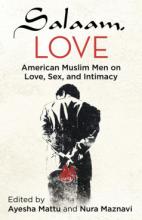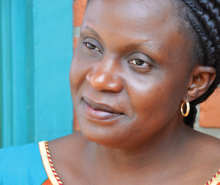sex

Oppressive. Boorish. Misogynist: Those are the popular images of Muslim men and how they treat women.
But there’s more to it than that, thought Ayesha Mattu and Nura Maznavi, the editors of Love, InshAllah: The Secret Love Lives of American Muslim Women.
Many Muslims welcomed the two women’s 2012 collection of 25 stories as an overdue conversation starter. Soon they got flooded with requests for a male version.
They initially dismissed the idea, assuming men wouldn’t want to write so openly about such intimate matters. But as the queries kept coming, the two editors decided a Muslim male version wasn’t that far-fetched, and given the stereotypes of Muslim men, much needed.

I didn’t watch the Video Music Awards last night, but this morning I noticed that Miley Cyrus is getting all the attention.
Mika Brzezinski on MSNBC’s Morning Joe gives voice to the moral outrage that many are feeling. She just couldn’t stop lambasting Miley for her performance:
That was really, really disturbing … That young lady, who is 20, is obviously deeply troubled, deeply disturbed … probably has an eating disorder … That was disgusting and embarrassing … I feel terrible … That was really, really bad. They [MTV] should be ashamed of themselves … She is a mess … I don’t want to see that ever again on this show … It was pathetic.
Well, Mika’s vehemence intrigued me, so I found the video on YouTube and watched it. It's bad. Awkward might the best word I can find to describe her performance, and it only became more awkward when Robin Thicke joined her onstage. Then it became awkward and demeaning. And I was instantly reminded of why I don’t watch the VMAs.

I’ve written before about the seemingly contrasting messages we offer to young people in church about sex and sexuality:
Sex is dirty; save it for someone you marry someday.
Umm, what? Granted, we walk a narrow rhetorical tightrope when discussing sex with our kids. If we tell them it’s actually pretty awesome, and then tell them they can’t do it, that’s a setup for failure. On the other hand, if we focus on the negatives, we risk scarring and shaming them into a life of emotional conflict and struggle when it comes to sexual intimacy.
What we end up with, often times, is a vacuous silence when it comes to the real, difficult issues of sexual identity, impulse, and expression. Add to that the Christian emphasis on marriage, and the result in many cases is scads of unhealthy, sexually awkward young people, married far too early with no idea why.

On April 5-12, the University of Tennessee hosted “Sex Week,” organized by the student organization Sexual Empowerment and Awareness in Tennessee. The week’s activities, ranging from discussions on virginity to workshops on oral sex and a search for a golden condom, sparked the concern of easily provoked and immensely quotable State Rep. Stacey Campfield (he of “Don’t Say Gay” bill fame).
With apologies to Campfield’s ever-vigilant protection of Christian sensibilities, the real problem here is not that mandatory student fees are being used to promote sexual education and awareness. The problem is that our tithes aren’t.
Imagine with me, if you will, what would happen if “Sex Week” came to First Baptist Church . . .
If local congregations joined together to dedicate a week to the promotion and exploration of Christian ethics expressed through sexuality, gender, and embodiment, what might the offerings look like? Perhaps these would be a good start.
MARTA AND LUISA had always fantasized about leaving their small town in northern Mexico to become dancers in a big city.
As the teenage sisters sat in the bed of a rusted pickup truck speeding toward the U.S. border, they thought their dreams would soon become reality. After sunset, the truck screeched to an abrupt stop. A middle-aged man with a skeleton tattoo on his arm hopped out of the driver’s seat, gritted his yellow teeth, and mumbled, “Vamos.” The time had come to complete the journey by foot.
Marta and Luisa walked closely behind the man and his two associates for hours along the desert paths they believed led to a brighter future. When they crossed the border into Arizona at about midnight, the tattooed man forcefully grabbed 16-year-old Marta and separated her from her older sister.
He explained that although he previously offered to help the girls cross the border for a small fee, the transportation cost had risen. Now Marta would have to work to pay off her debt. Alone.
Cecilia Hilton Gomez, director of Hispanic outreach programs for Free for Life International, describes the way that many human traffickers prey on vulnerable girls hoping to emigrate to the United States from Mexico and other parts of Central America. Since girls like Marta often have little education, lack formal paperwork, and have no knowledge of English, they become prime targets for traffickers looking to profit by selling women to brothel owners in the U.S.
“This is an epidemic, and it’s increasing,” Gomez states. “A lot of people think slavery has been gone for years, but it’s one of the largest criminal enterprises that exists now, and it’s right here in America.”
MY WIFE IS a pastor. Specifically, she’s the senior pastor of a prominent church in downtown Portland, Ore. I’m on staff too, but only part-time, and she enjoys telling people she’s my boss. Technically, I answer to the church board, but people get a laugh about the reversal of “typical roles.”
I get my share of “preacher’s wife” jokes, to which I have a handful of rote responses. No, I don’t knit or make casseroles. No, I don’t play in the bell choir. Generally, the jokes are pretty gentle, but they all point to the reality that few of us will actually talk about: We see the traditional roles of women as less important than those of their male counterparts. And so, to see a man who works from home most of the time and takes the kids to school while his wife has the “high power” job brings everything from the man’s masculinity to his ambition into question.
But regardless of the teasing I get, Amy has it a lot worse. One time, when she was guest preaching at a church in Colorado, a tall man who appeared to be in his 60s came up to her after worship. “That was pretty good,” he said, smiling but not extending his hand, “for a girl.”
Amy and I planted a church in southern Colorado 10 years ago, and we actually kind of enjoyed watching people’s expectations get turned on end when they met us. A newcomer would walk in the doors of the church and almost always walk up to me and start asking questions about our congregation.
“Oh, you’re looking for the person in charge,” I’d say. “She’s over there.” Then would come the dropped jaws and the wordless stammers as they reconfigure everything they assumed walking through the door. Amy’s even had people stand up and walk out in the middle of worship when they realize she’s about to preach.

THE DEATH OF a college student who had been gang-raped in Delhi provoked outrage and anger. More than 2 million Indian students joined a movement to protest the rising violence against women in India. According to official data, reported cases of rape have more than doubled in the past 20 years, and women are the victims of a high proportion of other violent crimes.
But there's another side to this story. "Almost as shocking as the Delhi gang rape has been the range of voices that have sounded after it," wrote Sagarika Ghose, a TV journalist and commentator. "Patriarchy is chillingly omnipresent." Rather than blaming those who attack women, leaders in some Indian villages blame Westernization, liberal consumerism, growing individualism, or even the women themselves—because they wear "skimpy clothes," talk on mobile phones, and work outside the home, according to South Africa's Mail & Guardian newspaper.
For 19-year-old Kanika Sharma, these leaders miss the point. "It is all about the mentality of the boys," Sharma told the Mail & Guardian. "They think because they are men, they can do anything. But girls should get equal rights and opportunities."
Sharma speaks while standing under a sign that says: Being a woman should not make you feel vulnerable. But sadly, throughout the world women do feel vulnerable.
Before I traveled to the Democratic Republic of Congo (DRC)—described as the "rape capital" of the world—I studied reports on rape as a weapon of war. In the DRC rebel soldiers have brutally raped thousands of women. They know that if they rape enough women and girls, they can destroy the social fabric of an entire community.

Ask Kelley Taylor, a Southern Baptist college student, if she's opened the steamy pages of Fifty Shades of Grey, and she has a ready response.
"Some of my friends have read it but I decided not to because I just heard about the content and didn't think it was something I should be reading," said the North Carolina State University senior, who is majoring in wildlife biology. "I think that it's kind of contrary to what the Bible says about fleeing from sexual lust and temptation."
Taylor is not alone. Many evangelical women say they wouldn't touch the best-selling book, often described as "mommy porn" because of its escapist appeal to working mothers and suburban housewives. But evangelical leaders also realize that some members of their churches and Bible studies can't resist.

“Your body is a wrapped lollipop. When you have sex with a man, he unwraps your lollipop and sucks on it. It may feel great at the time, but, unfortunately, when he’s done with you, all you have left for your next partner is a poorly wrapped, saliva-fouled sucker.”
I cringed behind the wheel, appalled at the quoted words I heard coming from my audio copy of Half the Sky as authors Sheryl WuDunn and Nicholas Kristof discussed this statement uttered by Darren Washington, an abstinence educator, at the Eighth Annual Abstinence Clearinghouse Conference.
Sadly, it wasn’t too far off many Christian messages I’ve received about sex.
But let’s go back to the beginning.

It’s amazing what a difference six words can make in our understanding of a figure as central as Jesus to the lives and faith of so many. Even historians and others who don’t claim Christianity personally are intrigued by the scrap of text recently discovered to contain, in Coptic, the sentence fragment: “Jesus said to them, ‘My wife…’”
Was this Jesus of Nazareth? is it authentic? Did the author have an original source to pull from, or simply word-of-mouth legend? After all, this writing seems to be several hundred years newer than the synoptic gospels. Perhaps Jesus was speaking in parable, as he often did, or maybe the “wife” was the Church, which often is referred to as “the bride of Christ.” Who knows? It’s likely we never will, but the buzz that this find creates is more interesting to me than the source of the scripture itself.
Why do we care so much if Jesus had a wife and kids or not? Why does it seem to matter if he died without ever having sex?

In the middle of the 16th century, Catholic bishops and theologians met sporadically in the city of Trento in northern Italy to discuss the church's response to the Reformation. Over the course of 18 years, the Council of Trent produced documents correcting abuses like indulgences and other corruption.
In 1564, the council ordered that some naked figures in Michelangelo's massive "Last Judgment" fresco in the Sistine Chapel be covered up as a result of the council's dictate that "all lasciviousness be avoided; in such wise that figures shall not be painted or adorned with a beauty exciting to lust."
It will be difficult for critics to compare Michelangelo's nudes with the ones photographed by the Rev. John Blair. Just after the Episcopal Diocese of Missouri launched an investigation of the St. Louis priest, many of his photos of nude models were removed from the Internet.
And yet the diocese's disciplinary board, whose members will decide if Blair's photography constitutes sexual misconduct, will try to answer the same question as Trent's participants 450 years ago: How does the church recognize the beauty of art that depicts God's creation — the human form — without seeming to condone "a beauty exciting to lust"?
PASTOR T.C. RYAN spent 40 years haunted by the shadow life of compulsive sexual behavior. Despite the challenges, Ryan never gave up hope of trying to reach the fullest recovery. He tells his story in Ashamed No More.
Compulsive sexual behavior put Tiger Woods into the headlines and made him an object of ridicule, as it has for so many others. In telling his own story, Ryan tears back the curtain to reveal the fuller story of painful realities, challenges, and hopes for those faced with the daunting task of recovery from similar compulsions.
“Those who are not addicted to sex understandably assume that the addict at least experiences enjoyment from the sexual activity, but this is not the case,” Ryan writes.
As Ryan describes it, he was living a divided life. In one arena he was a capable and gifted pastor. In the other he was plagued by shame, self-loathing, and an inability to stop destructive behavior. His extensive explanation of the cycle of addiction, the lies he had come to believe from childhood, the role that therapy and other supportive measures played in his recovery, and his hopes for how the church can become the ultimate 12-step program make every chapter of this book essential.

AS AN AUTHOR whose book sales have, shall we say, peaked, I took particular interest in the rising popularity of Just Love: A Framework for Christian Sexual Ethics, by Catholic Sister Margaret Farley. Until recently, her book had enjoyed only modest success, the predictable result of a title that gets the public’s blood racing with “sexual,” then quickly disappoints with the word “ethics,” the marketing equivalent of taking a cold shower while wrapped in a wet blanket. Toss in the word “Christian” and your sales possibilities are further reduced to a half dozen seminary students still looking for a thesis topic.
All of which violates the advice my grandmother gave me years ago: “Put sex in a book title, honey, and it’s money in the bank.” At least I think it was my grandmother.
But then a miracle happened. When officials at the Vatican read the book—between pensive walks in long robes (that’s what they do in the movies)—they were shocked and stunned, and immediately (six years later) declared it scandalous. This caused sales of Just Love to skyrocket. (Which proves the other thing my grandmother said: “No wait. I got it wrong. Have the Vatican criticize your book and then it’s money in the bank.”)
Vatican officials objected to Sister Farley’s frank theological exploration of modern sexuality which, anyone could have told her, is just not done when affiliated with a powerful religious institution that thinks “modern” means “the most recent part of the Middle Ages.” And back then, people didn’t talk about gay marriage or masturbation or any of the other issues Sister Farley thoughtfully ponders, not without enjoying the church’s hospitality sitting in wooden stocks for a few days.

Editor's note: This is a He Said, She Said on the issue. To read this author's husband's take, go HERE.
Who would have thought that five years into our marriage we would still be having this debate? Gender roles. Egalitarianism. Complementarianism.
If you've come here first, please read my husband's take on the issue before continuing on.
We tend to think fairly similarly, though he likes to think himself a complementarian, while I tend toward the egalitarian label. I love words, but that's all these are: words. I think it's all in how you define it for yourself. But since he brought it up …

Editor's note: This is a He Said, She Said on the issue. To read this author's wife's take, go HERE.
My wife and I have been embroiled in a deep debate lately. It involves gender roles, complementarianism, egalitarianism, and often threats of a kick landing somewhere on my body. It’s not that we haven’t worked this sort of thing out within our marriage — I take out the trash, she does the laundry — but somehow despite both being raised in Christian households we do not see theologically quite eye to eye on this issue.
I happen to fall on the side of complementarianism. For me this does not threaten the basic equality or God-given image and sense of worth that belongs to all humankind. But I do happen to think men and women were designed differently biologically and otherwise. Yesterday morning in yoga, I did my downward dog alongside 15 women and one other guy. I work in the same building as a special needs school with 22 female teachers and only one dude. I am happy to say that there are some areas women seem to be drawn toward, and in my opinion, excel in.
My wife on the other hand would like to argue (and does) that to pointing out any differences whatsoever leads necessarily to thinking in terms of an inequality. She believes that many of the Biblical mandates on gender roles have more to do with timing and culture than God-given norms.
CLEVELAND — Federal prosecutors will be allowed to question witnesses about Amish leader Sam Mullet’s sexual activities when the hate-crime trial of Mullet and 15 followers begins next week, a federal judge ruled on Monday.
U.S. District Judge Dan Aaron Polster also agreed to allow testimony about Mullet’s use of corporal punishment to control followers, but forbid prosecutors from describing his group with words such as cult, sect, clan, band, schism, faction, offshoot, breakaway, renegade, rogue, or splinter group. Witnesses, however, can use any terms they choose.
Polster’s rulings set the stage for a trial that is scheduled to begin Aug. 27 and is expected to attract national attention because of the unusual nature of the charges and the glimpse the case offers into a reclusive Amish community.

Whether wrestling with one the of non-heterosexual identities or the exigencies of birth control, the hidden costs of pornography, or the viability of chastity, 21st-century Christians have been confronted with unforeseen challenges that have led us to rethink traditional teachings on sexuality.
In many cases, particularly in more progressive expressions of faith, our sexual ethics have adapted and shifted more quickly than our theology (as is often the case). For generations to come, however, a sound theological framework is needed to support a robust Christian sexuality capable of dealing with “the world we find ourselves in.” The hands and feet of our ethical impulses have progressed boldly into unexplored terrain, but unless we discover the body that will provide a balance and stability, such ethical stances will be bound to collapse.
What we need is “a new kind of sexuality,” a response to emerging realities that is both orthodox and open, free and faithful. Such a framework will ultimately be bound to the Great Tradition of the Church while resisting enslavement to interpretations and applications of this Tradition that are now seem incapable of addressing heretofore unexplored questions. It is such “a new kind of sexuality” that I offer here, a starting point as we begin to shape a foundation that will provide the solid ground from which our ethics might find roots. I believe that such a framework will consist of the following five characteristics.

There’s plenty of fodder for sub-par parenting in the Good Book if we want to find it. But based on the examples of Christian parenting I see in more contemporary culture, the things we’d be best to move beyond are a little subtler (sometimes anyway) than the examples above.
Consider James Dobson’s (former head of Focus on the Family) writing on raising children. He advocates corporal punishment, placing the male as the “head of the household,” and other advice that makes a guy like me cringe. And interestingly, a lot of the differences I have with traditional (some might say “evangelical”) Christian parenting parallel my differences in how to approach Christian community all together.
In that light, here are five habits, often attributed to “Christian parenting” values, that I’d just as soon replace with something new.

The statistics, some evangelicals say, can no longer be ignored.
Eighty percent of young evangelicals have engaged in premarital sex, according to a new video from the National Association of Evangelicals. and almost a third of evangelicals’ unplanned pregnancies end in abortion.
It’s time to speak honestly about sex because abstinence campaigns and anti-abortion crusades often aren't resonating in their own pews, evangelical leaders say.
WASHINGTON -- Americans feel the "Christian faith" has a positive impact on help for the poor and raising children with good morals, according to a new poll, but it gets a bad rap on its impact on sexuality in society.
In a new study conducted by Grey Matter Research, more than 1,000 American adults were asked if the Christian faith had a positive, negative, or no real impact on 16 different areas of society, such as crime, poverty and the role of women in society.